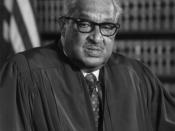Segregation has always been an issue of American life. Regardless of what race someone is, or where they live, there always are people opposed to their racial, ethnic, social, or religious background. There always are people who think they are better than others are, and who are trying to stop the advancement of the "inferior" peoples. One of the many court cases that have attempted to clear the human race of this corrupt way of life was named Brown versus Board of Education of Topeka, Kansas. While Brown v. Board mandated the end of segregation, prejudice and inequitable treatment still existed.
There always have been struggles for integration, of the United States public school system, ever since the infamous Plessy v. Ferguson Supreme Court Decision. Plessy v. Ferguson was a decision in which the United States Supreme Court determined that blacks and whites were "separate but equal" (P'Souza). This sparked much interest and states immediately took advantage of the easy way to negate the African American.
States like South Carolina created lines in their constitution that established laws such as "No child of either race shall ever, be permitted to attend a school provided for children of the other race." (Lindup). These conditions were making life ever harder for the average African American. Had "separate but equal" (P'Souza) been upheld justly, there may have been no fight for desegregation, but the vast majority of the time, equal schools were uncommon. African American schools were dirt, run down, and often only one room. White schools, on the other hand, were well kept with textbooks of good quality. In 1929, the state of Alabama spent $36 per white student and only $10 per black student in its public schools (Lindup). These differences aggravated many people, especially the father of a little girl...


